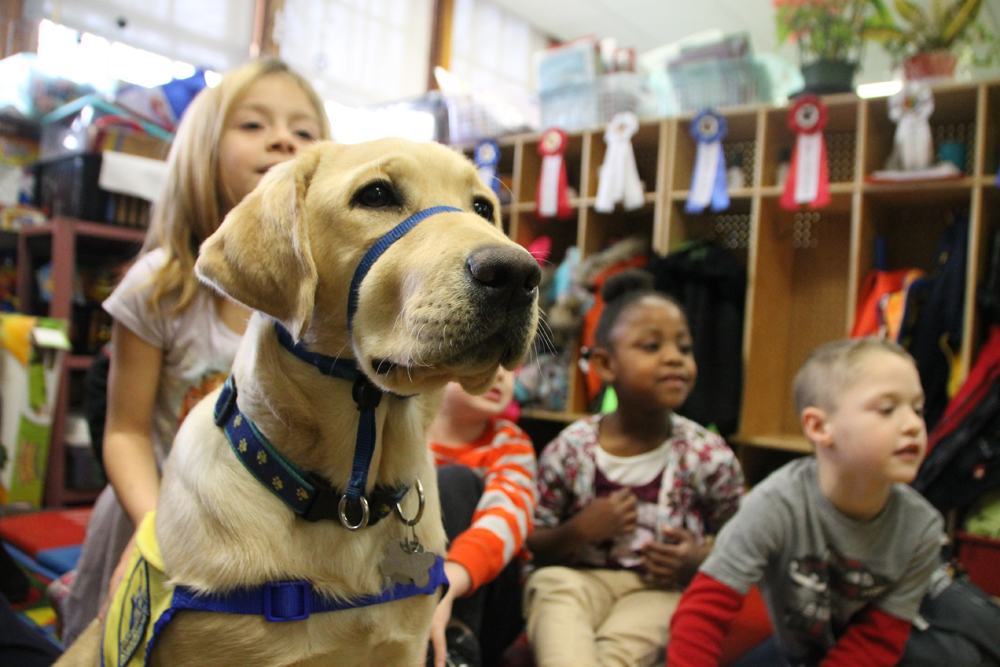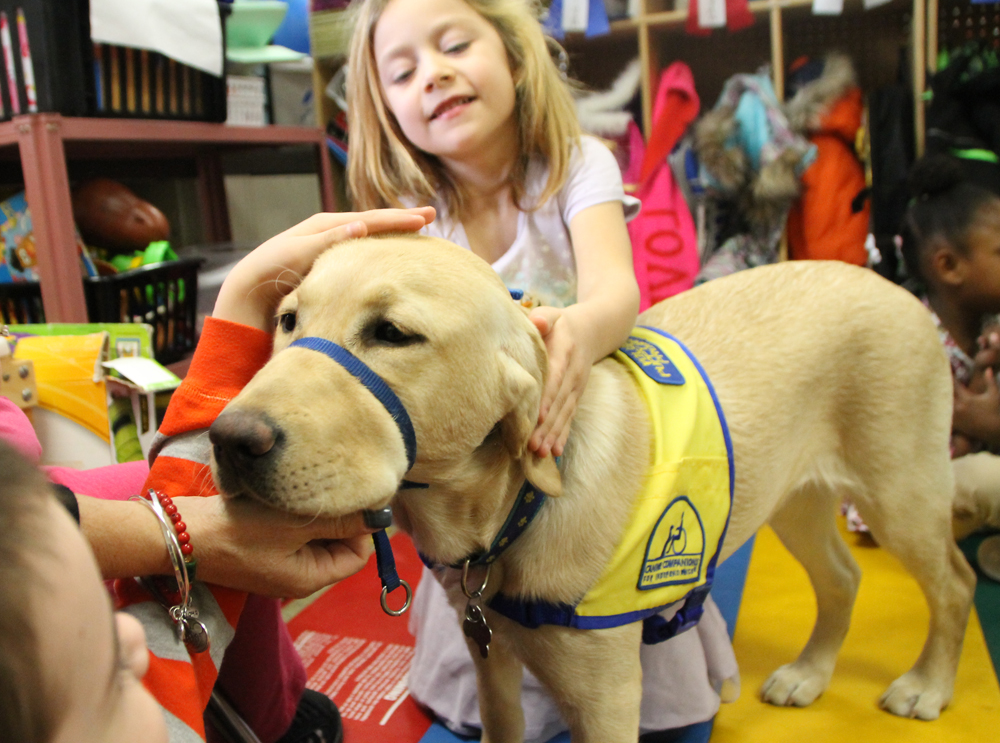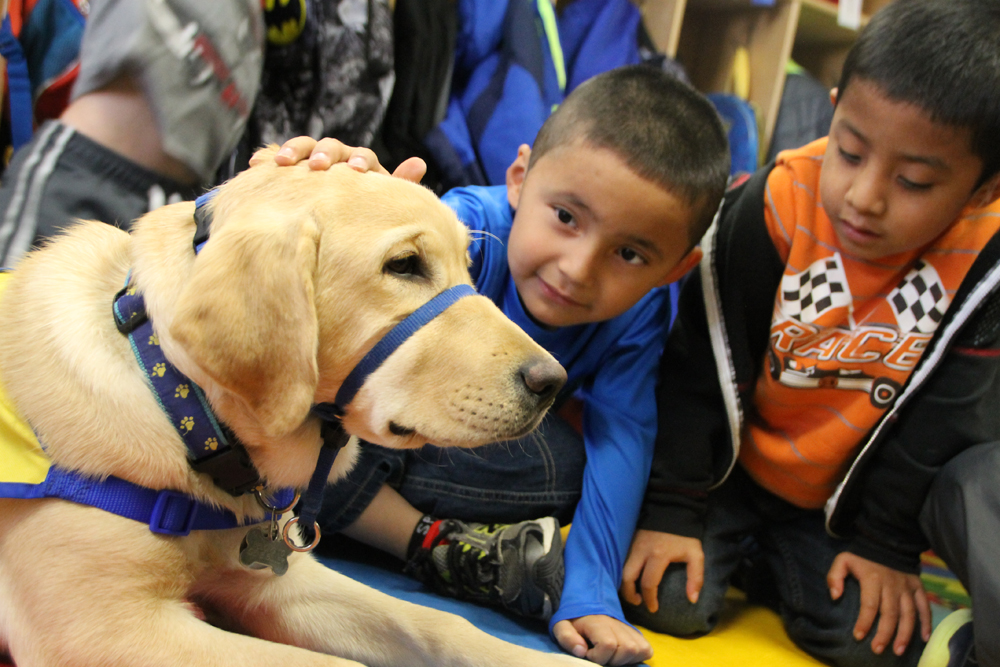‘Paw’-some program helps special education students at Aquebogue Elementary

Just after 11 a.m. Friday, a puppy charges down the hallway at Aquebogue Elementary School. Wearing her official yellow and blue Canine Companions for Independence vest, she trots around the corner to Joanne DeGruccio’s special education classroom and waits outside.
Syrah, a 5-month-old Lab-golden retriever mix, has been visiting this classroom for most of her life, said school social worker Heather Jablonsky. By now, she knows where to go when it’s time to work.
Ms. Jablonsky knocks on the classroom door and the dozen or so children inside let out squeals of delight as 49 pounds of flopping, yellow fur barrel into the room, greeting each of the children individually. The students, who have varying degrees of developmental disabilities, pet the dog and giggle. Syrah — pronounced sur-RAH — dutifully sniffs their faces, then waits calmly for them to pet her.
“I like it when she rolls,” said one student, 5-year-old Lyllian. “I like to give her belly rubs.”
Of course, Syrah is more than just a class pet. She’s part of a unique program at the school that uses the comfort of animal companionship to help special education students develop confidence.
“It almost puts them in control in some ways,” Ms. DeGruccio said. “They teach Syrah … It teaches them compassion and responsibility.”
Sandy Urban, a teacher’s aide in the classroom, said the dog has already affected the students’ lives.
Oscar, another student in the class, tended to be a quiet boy. But now that Syrah comes to visit, Ms. Urban said, “he’s finding his voice.”

Since October, when Syrah was just 8 weeks old, she has visited the classroom once a week. The students have watched her grow and measure that growth on a piece of easel paper taped to the wall.
The puppy now visits two special education classes at the school every Friday.
“Everyone is so excited when they see Syrah,” Ms. Jablonsky said. “I’ve had dogs all my life. But she is just a really smart, really sweet puppy.”
Before introducing Syrah, teachers at the school confirmed that no students in either class had severe dog allergies. The pup’s handler — a former teacher who asked not to be named — also had to get special permission to bring in Syrah from Canine Companions for Independence, the nonprofit group that raises service animals for physically and mentally handicapped people.
Lauren Ferraioli, puppy program manager for CCI’s Northeast region, said it’s important for puppies to be socialized by their volunteer puppy raisers. But not every dog will work with children, she said.
“It’s on a case-by-case basis,” she said.
Like all other Canine Companions, Syrah was born at a service dog breeder in California. The dogs are golden-Lab mixes because of the breeds’ loyalty, ease of training and versatility.
“They’ve worked very closely with humans for a very long time,” Ms. Ferraioli said. “That bond they have with humans, we need that. We need them to be adaptable. They’re very people-oriented.”
Once she was reared, Syrah was placed with her puppy raiser here on the North Fork, who will teach her commands and expose her to new environments until she is older. Syrah will eventually be assigned as a service animal to a new owner who needs her, Ms. Ferraioli said.
“It is the ultimate volunteer experience,” she said. “You get to change somebody’s life really.” The group is constantly on the lookout for new puppy volunteers, she added.

Ms. Ferraioli said service animals help their owners complete everyday tasks that would otherwise be impossible, like turning on lights and opening doors. Dogs are also therapeutic, she said, especially for children who may be socially isolated.
“The companionship is big,” Ms. Ferraioli said. “These kids that we’re serving don’t always have a lot of friends. Now they have a buddy that’s always there and will love them unconditionally.”
Ms. Jablonsky said the service puppy has been a success with the students so far.
“It’s just very motivating to them to be around Syrah and she is so gentle around them,” she said. “She’s such a mush.”
Earlier in the day, about 10 minutes before Syrah’s work in Ms. DeGruccio’s class began, there was a knock at the door of Ms. Jablonsky’s social work room. It was a teacher escorting a girl named Riley.
Riley, an older special education student at the Aquebogue school, was having a rough day and wanted to see Syrah. Having earned a visit with the puppy for her good behavior, Riley bounced into the room. “There’s Syrah here!” she exclaimed.
Syrah, ever diligent, immediately got to work nuzzling Riley and licking her hand.
Riley ordered Syrah to show off her tricks. She petted the puppy, fed her a treat and brushed her fur. She then climbed onto a nearby chair and began to read aloud from a book. Syrah lay down at her feet and listened patiently to the story. Soon, it was time for Syrah to head off to work, and Riley waved goodbye.
“You were a good puppy reader,” Ms. Jablonsky told her. Riley smiled.
Photo caption: Syrah, a 5-month-old Lab-golden retriever mix, pays close attention to the teacher in a special education class at Aquebogue Elementary School. The service puppy has been working with students there since October and so far has made a significant impact, the school’s social worker said. (Credit: Paul Squire)








